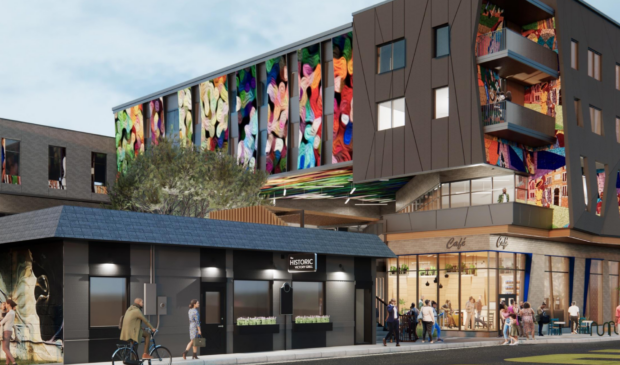With fate of Blocks 16 and 18 decided, focus could turn to 11th and 12th Street corridors
Friday, July 19, 2024 by
Chad Swiatecki City Council has given the OK for the Urban Renewal Agency to move forward in negotiations with the developer selected last month to lead the redevelopment of the 900 and 1100 blocks of East 11th Street.
Known in city planning circles as Blocks 16 and 18, the roughly 2 acres of mostly vacant land will be reimagined by the Pleasant Hill Collaborative team as a pair of mixed-use projects with substantial affordable housing.
The Pleasant Hill proposed development plan includes 130 units of housing, with the majority priced affordably for households earning less than 50 percent of the area’s median family income. Other planned features include 13,000 square feet of commercial space with small food-based retail; 27,000 square feet of cultural space for a music venue, working spaces and exterior and rooftop attractions; and 184 parking spaces.
Last month, the Urban Renewal Board, which has for years worked toward deciding how to redevelop the two blocks, said the PHC group has the proper experience with similarly scaled projects, as well as a commitment to public involvement and oversight in the redevelopment process. The community involvement considerations were seen as especially important because the properties sit in the heart of the city’s African American Cultural Heritage District.
Council Member Natasha Harper-Madison, whose district includes Blocks 16 and 18, said the city, community and developers have adapted redevelopment plans to stay in tune with current needs for the area.
“By way of a plan that dates to 1959, the Urban Renewal Plan has evolved with community participation, experiencing both losses and gains. Now, after decades of planning and countless hours contributed to the process, the work to bring these ideas to life can begin,” she wrote by email. “It is my hope that this project becomes a focal point for the community balancing preservation, historic legacy and celebration of a unique and intersectional part of East Austin.”
While the fate of the two city-owned blocks has long been secure, questions linger about properties elsewhere along 11th and 12th streets, a substantial number of which have been purchased in recent years by Dallas-based developer Eureka Holdings. The company has plans for the areas of East Austin that are at high risk of gentrification and displacement of Black residents, and the latest concerns are focused on an application to demolish a century-old storefront at Comal and 12th streets that was once a community gathering space.
After the June vote to support the PHC development plan, URB Chair Manuel Escobar told the Austin Monitor he hopes the board can focus on the surrounding community and explore ways to use tax revenues generated from the redevelopment to benefit areas that have historically lacked equitable investment opportunities.
“It’s our hope and we are going to be advocating strongly for – when there are additional revenues from this project and there’s a possibility of increased ownership by the city of this project at some point down the line – that those revenues don’t just go back into general operating, that those revenues continue to benefit this specific community,” he said. “That’s what this project is supposed to be about. It’s supposed to be about benefiting that community. We know there’s a lot of history that we can’t get around, things that have already happened, but we can try to do things with this project.”
URB Member Darrell Pierce said the group and other city entities need to ensure that its assets are utilized in the right way so that promises made by developers throughout the area are kept.
“Both (development teams) did a fairly good job and were willing to be flexible, knowing that there’s a long list of things that Council have prescribed in a resolution that we’re going to have to prioritize and make some tough decisions on and make sure that we understand that everything may not be able to be built on those blocks that are in that resolution,” he said.
The Austin Monitor’s work is made possible by donations from the community. Though our reporting covers donors from time to time, we are careful to keep business and editorial efforts separate while maintaining transparency. A complete list of donors is available here, and our code of ethics is explained here.
You're a community leader
And we’re honored you look to us for serious, in-depth news. You know a strong community needs local and dedicated watchdog reporting. We’re here for you and that won’t change. Now will you take the powerful next step and support our nonprofit news organization?




